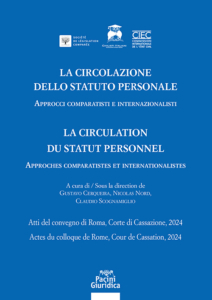Views
Online Symposium on Recent Developments in African Private International Law

It is not uncommon for African and foreign scholars of private international law (PIL) to lament the current state of the field in Africa. Until the early years of the 21st century, PIL was widely regarded, often with little hesitation, as ‘a neglected and highly underdeveloped subject in Africa’.[i] Professor Forsyth famously described it as a ‘Cinderella subject, seldom studied and little understood’.[ii] This limited scholarly attention is reflected, for instance, in the treatment of African PIL in the Hague Academy courses, which include only 4 courses specifically devoted to PIL in Africa, the most recent of which dates back to 1993.[iii] Since then, a number of pleas for greater attention to PIL in Africa,[iv] as well as calls for enhanced cooperation with African countries to ensure better involvement and inclusiveness,[v] have been voiced.[vi] Read more
Conflict of laws in the South African courts: an(other) recent missed opportunity
Posted on behalf of Jason Mitchell, barrister at Maitland Chambers in London and at Group 621 in Johannesburg.
An Australian, Hannon, wants to book a Southern African safari with his partner, Murti, as a surprise birthday gift. He sees one he likes on an Australian travel website. Hannon fills in the online form.
It turns out that the website is just the agent for a South African company, Drifters Adventours. Drifters emailed Hannon the price and payment details. Attached to the email is a brochure. The brochure says, “Drifters do not accept responsibility for any loss, injury, damage, accident, fatality, delay or inconvenience experienced while on tour.” The brochure also says, “You will be required to complete and sign a full indemnity prior to your tour departure.” Read more
The Titanium Brace Tightens: Rome II and Director Liability after Wunner
By Luisa Cassar Pullicino and Krista Refalo, Ganado Advocates
In the preliminary reference Case C-77/24 Wunner (the Titanium Brace case), the CJEU was asked to determine whether a damages claim brought by a consumer directly against company directors for losses suffered from unlicensed online gambling fell within the scope of the Rome II Regulation (Regulation (EC) No 864/2007), or whether it was excluded under Article 1(2)(d) as a “non-contractual obligation arising out of the law of companies”.
The practical stakes were considerable. If Rome II applied, Article 4(1) would designate the law of the place where the damage occurred — which, for online gambling losses, would normally be the habitual residence of the consumer. If excluded, the applicable law would instead be determined by national conflict-of-laws rules, typically, the lex societatis.
News
Hague Academy Collected Courses published in 2025
The following information was kindly shared with us by De Gryuter Brill.
The Hague Academy is a renowned international institution dedicated to the study and teaching of public and private international law. Supported and recognized by the United Nations, the Academy aims to foster rigorous and impartial analysis of legal issues arising from international relations. Its courses address both theoretical and practical dimensions of international law, including legislation and case law. In principle, all courses are published in the Collected Courses of The Hague Academy of International Law in the language in which they were originally delivered. The courses on private international law that were published in 2025 are:
- Volume 451: Garcimartin, F.: Responses to a Legally Fragmented World: A Private Law Perspective (General Course of Private International Law)
- Volume 449: Esplugues, C.: New Dimensions in the Application of Foreign Law by Courts (and Arbitrators) and Non-Judicial Authorities
- Volume 446: Dickinson, A.: Natural Justice in Recognition and Enforcement of Foreign Judgments
- Volume 446: McLachlan, C.: On the Interface Between Public and Private International Law (General Course on International Law)
- Volume 445: Rodríguez Benot, A.: Le régime économique des couples en droit international privé
For a full listing, including the courses on public international law and international arbitration, please visit The Hague Academy Collected Courses Online / Recueil des cours de l’Académie de La Haye en ligne.
Virtual Workshop (in English) on February 3, 2026: Stellina Jolly on “Forging a Path for Climate Justice: Integrating Public and Private International Law in Transboundary Litigation in India”

On Tuesday, February 3, 2026, the Hamburg Max Planck Institute will host its monthly virtual workshop Current Research in Private International Law at 11:00 a.m. – 12:30 p.m. (CEST). Stellina Jolly (South Asian University) will speak, in English, about the topic
“Forging a Path for Climate Justice: Integrating Public and Private International Law in Transboundary Litigation in India”
Cross-border climate litigation, gaining traction globally, requires active engagement with private international law for effective dispute adjudication. Although Indian climate jurisprudence has not yet substantively addressed cross-border disputes, emerging trends suggest that this scenario may soon evolve. The talk analyses three plausible litigation scenarios involving Indian and foreign parties to assess the readiness of Indian private international law in addressing transboundary climate harm. Firstly, Indian plaintiffs filing cases in foreign jurisdictions against transnational corporations headquartered abroad, alleging climate-related harm caused within India; secondly, foreign plaintiffs filing cases before Indian courts for the harm caused by Indian transnational corporations in their jurisdictions; thirdly, foreign plaintiffs filing cases before Indian courts for the transboundary harm caused by Indian companies as a result of their Greenhouse gas (GHG) emissions. The talk evaluates the adequacy of Indian private international law in addressing cross-border climate cases and proposes incorporating environmental and human rights considerations in the determination of choice of law.
The presentation will be followed by open discussion. All are welcome. More information and sign-up here.
If you want to be invited to these events in the future, please write to veranstaltungen@mpipriv.de.
New Book: La circolazione dello statuto personale / La circulation du statut personnel
 A new collective volume entitled “La circolazione dello statuto personale / La circulation du statut personnel” has recently been published by Pacini Giuridica. Edited by Gustavo Cerqueira (Nice), Nicolas Nord (Strasbourg) and Claudio Scognamiglio (Rome), the book brings together the proceedings of an international conference held on 19 January 2024 in Rome, in the prestigious Giallombardo Hall of the Italian Court of Cassation. Read more
A new collective volume entitled “La circolazione dello statuto personale / La circulation du statut personnel” has recently been published by Pacini Giuridica. Edited by Gustavo Cerqueira (Nice), Nicolas Nord (Strasbourg) and Claudio Scognamiglio (Rome), the book brings together the proceedings of an international conference held on 19 January 2024 in Rome, in the prestigious Giallombardo Hall of the Italian Court of Cassation. Read more



